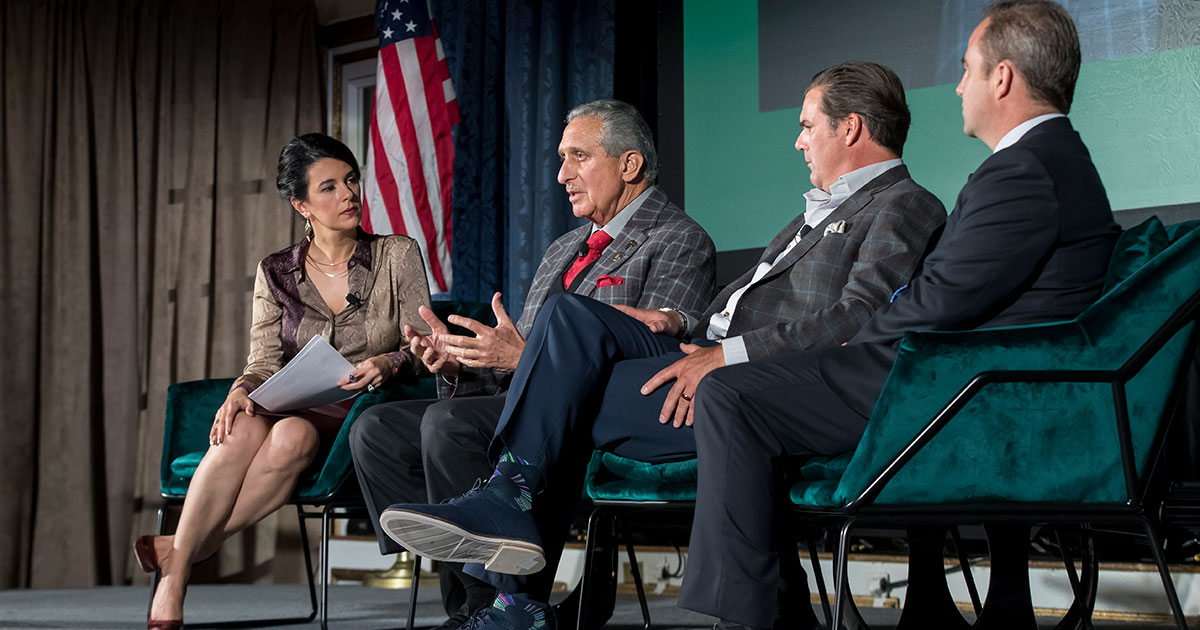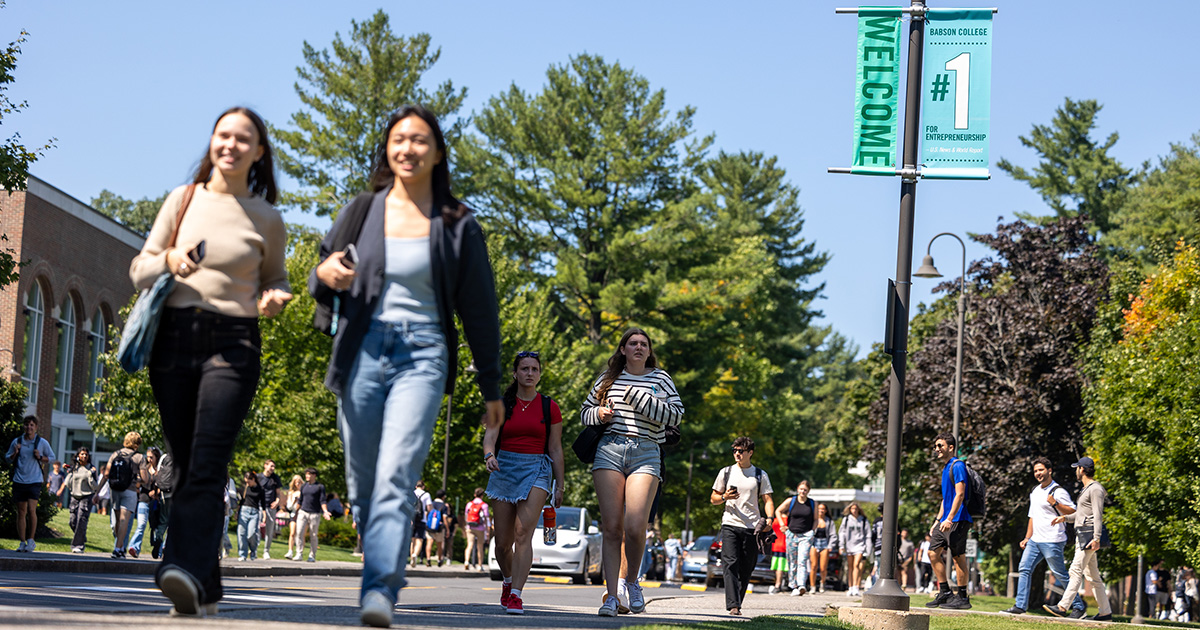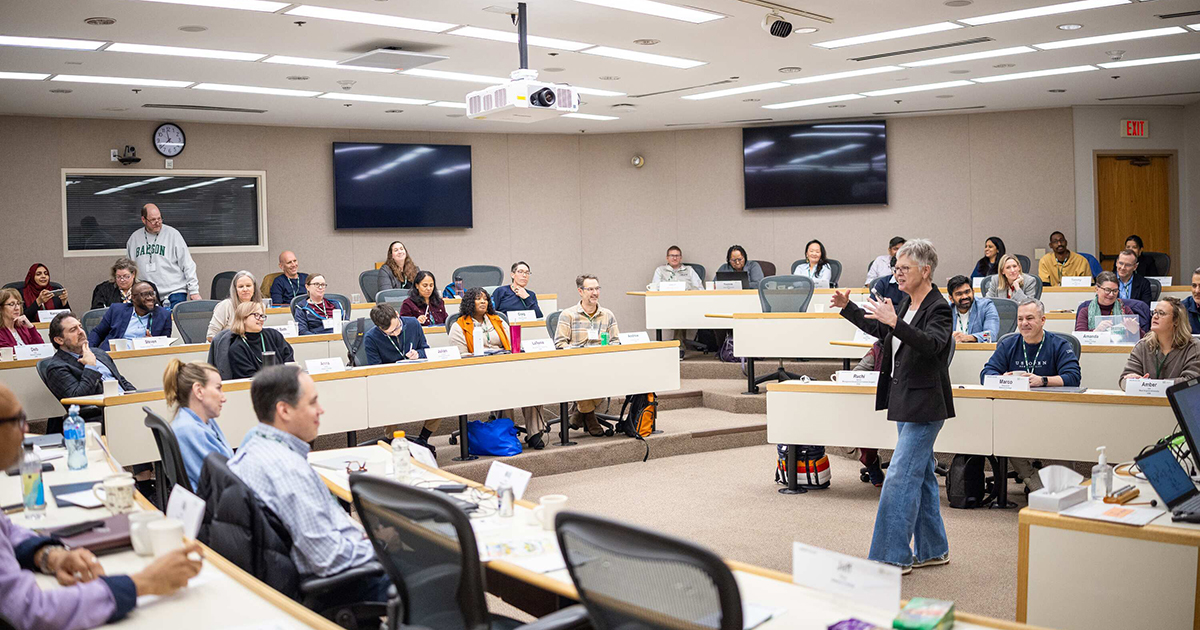The Business of Sports

The concepts to building a winning team aren’t just limited to the playing field. The right organizational structure, a distinct strategy, and strong leadership transcend between both the office and the ballpark, says industry experts Linda Pizzuti Henry ’00, Arthur Blank ’63, H’98, Phil Castellini ’92, and Geoff Molson MBA’96, who shared the optimal methods for success last week at Babson’s Centennial Celebration.
“What does it take to build a winning team?” Pizzuti Henry asked. “The three gentlemen here today have a lot of experience doing just that. They wake up thinking of this every day to make that happen.”
Focusing on Fans First
Arthur Blank is the owner of the National Football League’s Atlanta Falcons and Major League Soccer’s Atlanta United FC. In 2017, the Falcons made their second Super Bowl appearance. Later that year, Atlanta United FC began play, and won its first MLS Cup in 2018. Earlier this year, Atlanta United FC added two more trophies to its now-growing case: the U.S. Open Cup and the Campeones Cup.
Blank said his soccer’s team’s rapid progress is linked to listening to its primary stakeholders: its fans.
“Our culture is all about relationships, none of it has to do with return on sales, investments,” Blank said. “Everything that we’ve done from day one has been focused on the fans.”
Just last month, Atlanta United FC set the MLS record for single-game attendance, when the club drew 72,548 fans for a match against the LA Galaxy.
“We listen to them, we respond to them, we believe the wisdom of many is better than the wisdom of one,” Blank added.
Rooting for the Community
Cincinnati Reds president and chief operating officer Phil Castellini assumed his role with the team in 2006, when his father, Reds CEO Bob Castellini, led a group of investors to purchase the team.
A longstanding figure in the local community, Montreal Canadiens co-owner Geoff Molson purchased the Canadiens in 2009. Both Castellini and Molson agreed community engagement are top priorities for their respective operations.
“We are deeply rooted in the community,” Molson said, adding that the family constructed the first hospital, school, and railroad in Montreal. “Our culture starts with that … being part of the city in every way we possibly can.”
You can’t build a culture without character, which is stressed when the team is acquiring talent.
“When we draft a player, there’s no question there has to be talent,” he said. “But, throughout the course of their career, we need to surround them with the right resources, people, education, so they do become leaders. … Having a good strategy starts with hiring the right people.”
Reaping the Rewards of a Strong Strategy
When a culture has been established, the fans follow. This season, the Cincinnati Reds celebrated their 150th anniversary, and Castellini was part of the group that planned the yearlong celebration.
“We really laid out a great plan that allowed that celebration to take place all year long, regardless of what’s happened team performance wise,” Castellini said.
Mercedes-Benz Stadium, home of the Falcons and Atlanta United FC, has been praised for its affordable concession prices. Hot dogs cost just $1.50, and pretzels, bottled water, and soda can be purchased for just $2.
“We listen to (the fans), we respond to them, we believe the wisdom of many is better than the wisdom of one.”
Arthur Blank, '63, H'98
In concert with a team of star players, this creates a positive experience for fans.
“Fans need to feel that the owner has put all his chips into the middle of the table,” Blank said. “Hire the best coaches, have the best resources, retain the best players.”
For Arthur Blank, Phil Castellini, and Geoff Molson, this wealth of knowledge and experience in sports and business all traces to their education at Babson.
“I left Babson feeling confident I could negotiate something, feeling confident I could analyze something, feeling confident that I could work on a team, lead a team,” Molson said. “You go through real case studies, real situations, you leave feeling like you can do this.”
Posted in Entrepreneurial Leadership, Insights




